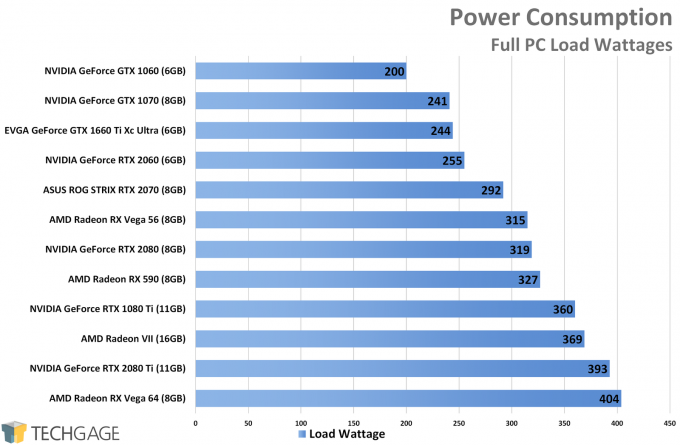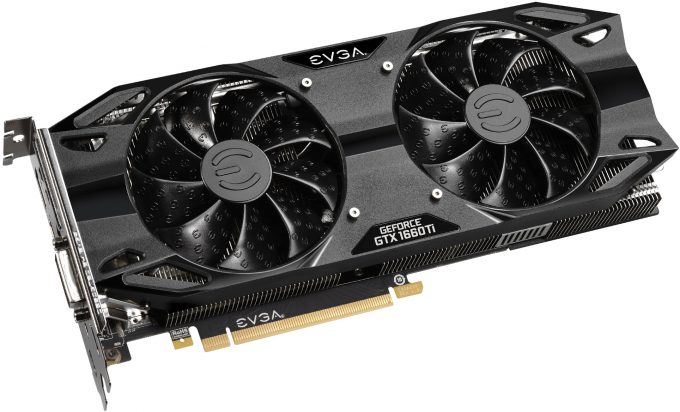- Qualcomm Launches Snapdragon 4 Gen 2 Mobile Platform
- AMD Launches Ryzen PRO 7000 Series Mobile & Desktop Platform
- Intel Launches Sleek Single-Slot Arc Pro A60 Workstation Graphics Card
- NVIDIA Announces Latest Ada Lovelace Additions: GeForce RTX 4060 Ti & RTX 4060
- Maxon Redshift With AMD Radeon GPU Rendering Support Now Available
EVGA GeForce GTX 1660 Ti Xc Ultra Gaming 1080p & 1440p Gaming Performance

NVIDIA’s GeForce GTX 1660 Ti becomes the fifth card based on Turing to be released, but unlike the RTX cards we’ve seen up to this point, the 1660 Ti foregoes Tensors and RT cores in favor of delivering a more competitively-priced product, and an all-around enticing competitor. Let’s see how it stacks up against NVIDIA’s own lineup, and AMD’s competition.
Page 5 – Power Consumption & Final Thoughts
Power Consumption
To test for power consumption, a Kill-A-Watt that the PC itself is plugged into is used for monitoring a Far Cry 5 4K benchmark run. Admittedly, we don’t have the best methods for power testing, and would love to improve them in the future, but for now, we use what we have, and that’s our eyeballs. Over the course of the one-minute benchmark, a rough average is pulled.
With its performance, the 1660 Ti still manages to sip a modest amount of power compared to some of the higher-end cards. Despite not being far off from Vega 56 performance in many cases, that card draws 60W more at load, which is actually still less than what the RX 590 draws (despite that card being slower).
On the noise front, it’s hard to imagine one 1660 Ti is going to be much worse than another, but in the case of this EVGA Xc card, it runs fairly quiet even when the going gets tough. We don’t measure sound, but it’s not hard to “hear” a card even if you don’t want to, so the loud cards always stand out, and this one certainly didn’t.
Final Thoughts
NVIDIA’s GeForce GTX 1660 Ti didn’t quite come out of nowhere, as it’s been a major subject of interest in the rumor mill for a while. However, the name itself hasn’t been really solidified until recently. There were previous rumors about this card being called 2050 Ti. It seems likely that NVIDIA chose the 10-series esque name on purpose, simply to avoid confusion with regards to RTX features. Not that 1660 isn’t a strange name in itself, but so was GTX 1080 when it came out, and we all seemed to get used to it.
Against AMD’s Radeon RX 590, the GTX 1660 Ti cleaned house in every single one of our real game tests, and that alone is enough to tell you which card you should be seeking out. This is unfortunate for AMD, since the 590 only released in November, and the 1660 Ti isn’t exactly kind with its leads sometimes.
As mentioned in the intro, AMD reached out to us last night to tout a $279 Vega 56 that could be found at Newegg. These kinds of emails ahead of a competitor launch are common, and perhaps more common is the fact that the deals are gone before the vast majority of fans have a chance to take advantage. AMD wanted to throw a wrench in NVIDIA’s gears a bit ahead of this launch, and it seems unlikely that we’ll see many more $279 Vega 56s hit etail in the near-future.
That leads us to the RX 590. It could still be competitive with a price drop, but the sad fact is, this was a card that was competitive right on up until this 1660 Ti launched. AMD will have to be more aggressive with that pricing, especially if it ever wants to drop Vega 56 to $279 again. Doing that wouldn’t benefit AMD, as Vega cards are expensive to make thanks to their inclusion of HBM.
Nonetheless, pricing will dictate everything here, so whatever you’re after, patience will pay off if you want to monitor etailers and see when the best deal drops. As it stands today, though, the 1660 Ti at its $279 price point is impossible to beat. The RX 590 draws 83W more than the 1660 Ti at full load, and even if you say you don’t care about power, 83W is a huge amount for a card of equal or less performance.
At this point, we’ve had our 1660 Ti for under 24 hours, but our first impressions are actually really good, which we admit was kind of unexpected. I was told by an industry friend that I wouldn’t be too impressed, yet I am. It’s hard to not be impressed when NVIDIA is infusing a ton of performance into the $279 price point.
Support our efforts! With ad revenue at an all-time low for written websites, we're relying more than ever on reader support to help us continue putting so much effort into this type of content. You can support us by becoming a Patron, or by using our Amazon shopping affiliate links listed through our articles. Thanks for your support!







